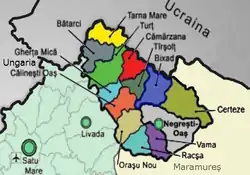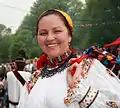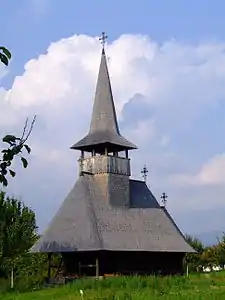Țara Oașului
Țara Oașului (Hungarian: Avasság) is an ethnographic and historical region of Romania located in the North-East part of Satu Mare County, 50 km from the city of Satu Mare, also 50 km from the city of Baia Mare. The total area is about 755.30 square kilometres (291.62 sq mi). The capital of Țara Oașului is Negrești-Oaș town.[1]

Boundaries
Țara Oașului extends from Turț – Gherța Mare – Gherța Mică (on the western side) all the way to Huta pass situated at an altitude of 604 m (in the East), from Cămărzana (in the North) to the mountains that surround Orașu Nou, Racșa and Vama (in the South).
Communes
Țara Oașului comprises the following communes:
Geography
The Oaș Depression has maximum altitudes of 400–500 m. Most of the human dwellings are situated alongside the river valleys that cross the Oaș Depression. In the Northern part of the depression there is the Lechincioara Basin which includes the Mare, Semănaturii and Lechincioarei valleys. In the southern part of Țara Oașului there are the Tur, Alb, and Rău rivers.
History
The first document that mentioned Țara Oașului dates from 1270, when the King of Hungary donated to a nobleman several villages from the southwestern boundary of the "country".
In that document Țara Oașului is mentioned as Terra Awas. Some historians claim that the origin of the word "Oaș" is the "Awas", which means a kind of deforestation or a clearing in the woods.
Țara Oașului was mentioned in the Chronicles of Grigore Ureche.
Gallery
 Local folk singer Maria Tripon in traditional costume
Local folk singer Maria Tripon in traditional costume Local folk singer Ionuț Silaghi de Oaș in traditional costume
Local folk singer Ionuț Silaghi de Oaș in traditional costume Wooden Church from Lechința, Open Air Museum of Țara Oașului in Negrești-Oaș town, 2008
Wooden Church from Lechința, Open Air Museum of Țara Oașului in Negrești-Oaș town, 2008 Oaș folk ensemble in the Museum of Țara Oașului
Oaș folk ensemble in the Museum of Țara Oașului Open Air Museum of Țara Oașului in Negrești-Oaș town
Open Air Museum of Țara Oașului in Negrești-Oaș town Huta pass
Huta pass
References
External links
- Presentation
- Pictures of Țara Oașului
- http://www.oas.ro/
- http://www.incogniterra.org/pages/events/sambra.html